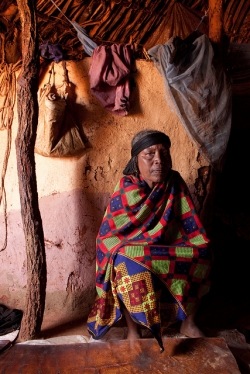 It is obvious from observations in Borana and Moyale districts in southern Ethiopia that older people are bearing the brunt of the lack of rains in the region.
It is obvious from observations in Borana and Moyale districts in southern Ethiopia that older people are bearing the brunt of the lack of rains in the region.
We met a number of older people, women and children in the villages, but very few young men. They had gone off with the few cattle that have survived the harsh conditions, looking for pasture and water.
One older man told us that his sons had taken the cattle two hours walk away where some water was available.
Resigned to their fate
The districts I visited are not too far from the Kenyan border, particularly the Kenyan town of Moyale. Many able-bodied people have moved there, believing the aid they will receive on the Kenyan side will be much better.
For older people, the journey there is treacherous and most are not even considering travelling there. They are resigned to their fate.
The only water available is dirty
The water available in few springs or rivers that have not yet dried up is dirty. This water is what the people rely on, not just for the cattle, but for their daily consumption. The water is causing stomach pains and diarrhoea among the older people.
It gets really cold in the morning, an illusion that the weather might improve. The drought-resistant bushes around the region also give the impression of some greenery. There are hills in the distance that seem green from here too.
However in the villages, it is extremely dry. Carcasses of dead cows are visible. Thankfully, the villagers have learned from the previous droughts that they have to burn the carcasses. If not, when the rains finally fall, the carcasses will cause diseases.
Living on one meal a day
The food situation was beyond depressing. The villagers are living on one meal a day. This meal consists of boiled maize or boiled wheat. They eat this either at lunch or for supper. In the morning or late in the evening, black tea is the only beverage they can take.
This is really harsh for older people. Their dietary needs are not met. Safo Bonaya Boru, a 90 year old woman, cannot eat the maize because it is too hard for her teeth. She resorts to drinking the water used after the maize is boiled.
We also met 60-year-old Halake. In the video below he talks poignantly about the severe and painful effects of the drought. It was difficult to hear.
My experience was extremely humbling. It is hard for most people to imagine living on such a diet. Worse still, the condition is not improving but getting worse. Only time will tell what people will eat if food donations are not forthcoming.
PLEASE DONATE: HelpAge’s work is supported by our sister organisation Age UK. Please donate to Age UK’s East Africa appeal for vulnerable older Ethiopians and their families affected by the drought.
Age UK is raising money together with the Disasters Emergency Committee (DEC) for the East Africa Crisis. The DEC is a consortium of 14 aid agencies working together.
READ MORE news on the east Africa crisis.
